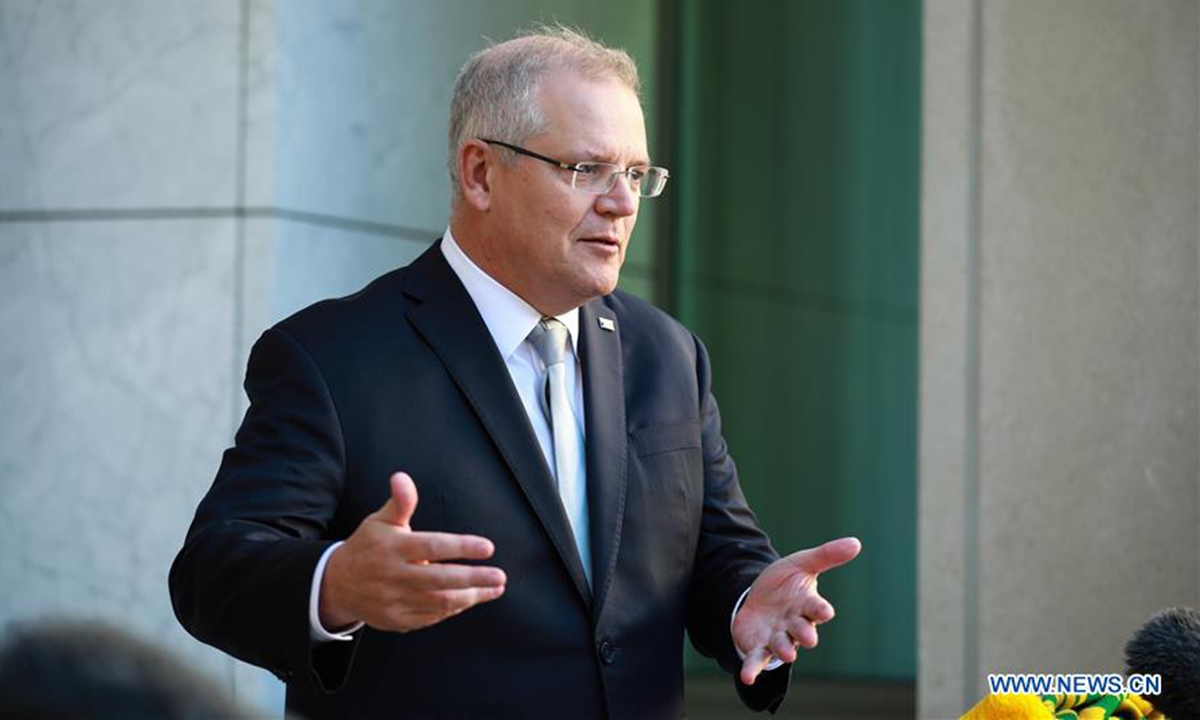Morrison’s defense blueprint reveals Canberra’s anxiety
Source:Global Times Published: 2020/7/2 20:48:40

File photo: Xinhua
Australian Prime Minister Scott Morrison on Wednesday unveiled a new defense blueprint which focuses on the Indo-Pacific region. It boosts defense spending by 40 percent over the next 10 years. What is Australia's motivation behind the move? Quite a few Australian media rushed to the conclusion that China is the unspoken threat at the center of the new defense strategy.
The media outlets are simply trying to attract more eyeballs in haste. The truth is Australia has multiple considerations behind the move.
China is just one part of the reasons. Its peaceful emergence has completely changed the strategic and regional environment of the Land Down Under. China's rise and the so-called strategic uncertainty it presents have been a major strategic issue for Australia.
Moreover, given its declining diplomatic status, Australia has been pursuing a "creative middle power" path and is eager to reverse its unfavorable state of diplomacy. In Australia's "Defence White Paper 2013" the country categorically termed its zone of strategic interest the Indo-Pacific. This made the Australian government the first to have defined the region in this way. Canberra is directly seeking to turn the concept into its own version of a practical strategy by boosting military deployment in the region.
By upgrading its defense forces, Australia also hopes to lift its alliance with the US to the next level. For a long time, the Canberra-Washington alliance has been the cornerstone of Australia's diplomatic and defense strategies. Yet in the face of China's peaceful rise and contractions of the US, Australia is caught up with an unprecedented anxiety. In order to help maintain the US presence in either the Indo-Pacific or Asia-Pacific region, Australia has tried hard to promote its alliance with the US. From the perspective of Australia, this has mainly been done to prevent a scenario where Canberra might have to deal with China alone in terms of security.
Such anxiety and concerns are excessive and unnecessary. China has never posed substantial threats to Australia's national security. The two countries are geographically far away from each other - not to mention they have no territorial, sovereign and historical disputes.
Australia has been depending on its "great and powerful friends" in diplomacy, including the UK before the World War II and the US after the war. After former prime minister Gough Whitlam assumed office in 1972, the country started to reduce its reliance on the US and to pursue more independent strategies. Later, Australia attempted to integrate with Asia more following the election of John Howard in 1996. At the same time it also resuscitated the US alliance.
As a middle power, Australia has been gaining advantages from both sides of the East and West - China and the US. Yet since the financial crisis of 2007-08 and especially after Trump took office, geopolitics has overwhelmed geoeconomics, while major power competition to a large extent replaced previous cooperation in Asia-Pacific region. The room for Canberra to maneuver between Beijing and Washington is shrinking with less and less opportunities to show Australia's diplomatic creativity.
Australia, with geopolitical ambitions, is obviously not satisfied with the status quo. It is hoping to play a more significant role in the region by boosting defense spending and shifting defense focus.
Yet these aims will be hard to realize. If Australia really yearns to elevate its diplomatic status and expand its influence, it will have some hard thinking to do over how to make up for the huge gap between its strategic resources and aims, and how to make best use of its advantages while bypassing its disadvantages. Australia must carefully weigh its current military strengths with that of its population and economy.
The article is compiled by Global Times reporter based on an interview with Xu Shanpin, adjunct researcher at the Center for Australia Studies, China University of Mining and Technology. opinion@globaltimes.com.cn
Posted in: VIEWPOINT